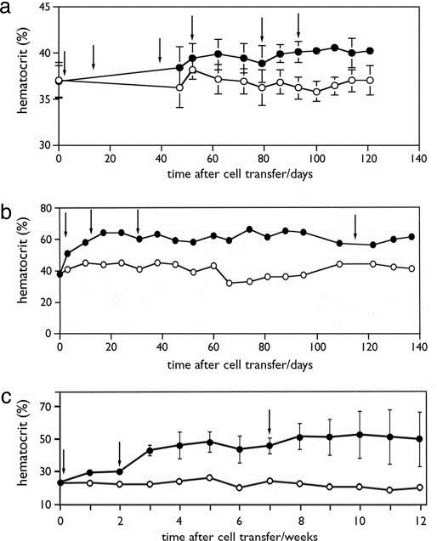Human erythropoietin (hEPO) is an essential survival and growth factor and plays an essential role in the production and maturation of red blood cells. Therefore, the hEPO is a common choice for treatment of the anemia. With the application of recombinant DNA technology, the hEPO gene has been molecularly cloned, sequenced, and expressed in a biologically active form in mammalian cells. The recombinant hEPO products have been used in the treatment of anemia caused by renal causes and malignant tumor radiotherapy and chemotherapy.
Engineering exogenous protein production in B cells may have therapeutic applications in protein deficiency diseases such as anemia. Engineering B cells with hEPO expression is a promising strategy that could produce hEPO at therapeutic levels over long durations, correcting hEPO-deficient anemia. Creative Biolabs has launched a suite of B cell engineering services for the generation of custom-modified B cells for therapeutic hEPO delivery. Our state-of-the-art labs are staffed by some of the best-trained and most experienced subject matter experts in the field. Combining our advanced proprietary technology with our unparalleled expertise, we help clients rapidly and reliably generate B cells expressing therapeutic hEPO.
Q1: which technology is the best for B-cell engineering?
A1: These technologies vary in price, turnaround time, difficulty of gene insertion, and integration method. As such, you need to decide or contact us to discuss what type of research and experimentation you are conducting to determine which method would best meet your needs and requirements.
Q2: How long is the turnaround time for a B-cell engineering project?
A2: The turnaround time depends on the project.
The following are the results of mouse B cells engineered with hEPO protein.
 Fig.1 Schematic Representation of The Therapeutic Approach in a PSMA (+) Prostate Cancer Cell.1,2
Fig.1 Schematic Representation of The Therapeutic Approach in a PSMA (+) Prostate Cancer Cell.1,2
 Fig.2 Correcting anemia in
mutant mice by transferring hEPO transgenic B lymphocytes. (Takács, et al., 2004)
Fig.2 Correcting anemia in
mutant mice by transferring hEPO transgenic B lymphocytes. (Takács, et al., 2004)